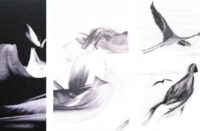Immunity takes things even further, those calm, classical moments becoming buried even deeper beneath aggressive blankets of hyper-advanced sound design and fizzling techno. When they do emerge, it’s usually in a track’s closing moments, together with swathes of field recordings of the ocean or the elements.
 In the months since its June release, Jon Hopkins‘ new album Immunity has created major waves, and raised the profile of the limelight-skirting Hopkins himself even further. His work with Brian Eno on the somewhat coolly received Small Craft on a Milk Sea and co-producing duties on Coldplay’s fourth album had already served to raise his profile considerably. Then there were his collaborations with King Creosote (who appears here as well) on the Mercury nominated 2011 Diamond Mine album, a score for the critically acclaimed UK independent movie Monsters and a recent stint supporting Pet Shop Boys at the London O2 on their Electric tour.
In the months since its June release, Jon Hopkins‘ new album Immunity has created major waves, and raised the profile of the limelight-skirting Hopkins himself even further. His work with Brian Eno on the somewhat coolly received Small Craft on a Milk Sea and co-producing duties on Coldplay’s fourth album had already served to raise his profile considerably. Then there were his collaborations with King Creosote (who appears here as well) on the Mercury nominated 2011 Diamond Mine album, a score for the critically acclaimed UK independent movie Monsters and a recent stint supporting Pet Shop Boys at the London O2 on their Electric tour.
Immunity is a bold statement of intent regardless of whether it indicates a future direction for Hopkins. His previous album for Domino, Insides was far removed from his first two albums, retaining a classical approach to compositions and championing piano and strings but embellishing them with edgier, experimental and dense electronic arrangements and sound design. It may have spun off into the occasional aural meteor storm, but would always return to a soothing center.
Immunity takes this even further, those calm, classical moments becoming buried even deeper beneath aggressive blankets of hyper-advanced sound design and fizzling techno. When they do emerge, it’s usually in a track’s closing moments, together with swathes of field recordings of the ocean or the elements. But if you think for one second that you let Immunity fade into the background as was possible with some of his previous work, then think again.
The sound of traffic, the jangling of keys and a door slamming describes Hopkins’ arrival at Cafe Music studios, at which he busied himself across the eight months spent recording Immunity. “We Disappear” then fades into view, a reflex twitching, body-jacking, techno-crunch-athon with wiry falsettos twisting in the vortex. It gently melts into fading, spectral vocal coos and delicate piano key droplets, a contrast that soon becomes a regular occurrence on the album. “Open Eye Signal” sets cloud-scattered, high-altitude, icy pads against a buzzing, engine-gunning growl and motorik bass lines, “Breathe This Air” builds on this and partners reflective piano with switchback techno stabs before a blistering crescendo is reached across nine relentless minutes in the building thud, reversed cymbals, spectral pads, momentary mutated vocal snapshots and hallucination-inducing feedback loops of “Collider.” Background listening this is not, and anything less than your full attention will rob you of layers of detail and melodic complexity.
If you make it past this point, you’re in for a slightly easier ride. It’s rumored that the structure of the album is said to mirror the highs and lows of a night out, much like Hauschka’s techno-via-prepared-piano experiment Salon des Amateurs. If so, the comedown begins with “Abandon Window,” the album’s one truly contemplative moment featuring sparse, minimal piano borne on a soft breeze that dissolves into clouds of reverb and angelic voices, finally lost on the squall-obscured horizon.
And then there’s the near twelve minute “Sun Harmonics,” as fine an example of a slowly evolving epic as you could ever hope to find. Velvety-soft, windswept, sandy textures and a distinctly Thomas Fehlmann vibe a la Gute Luft and Baghdad Batteries pervade, mottled and foxed with crumbling feedback (the kind you hear when twisting a dry headphone connection) before Hopkins confounds us again in the final two minutes as the whole thing is swept away, leaving just the sounds of the sea and the wind. Perhaps this is one of the roots of them album’s widespread success: no matter how blisteringly intense things get, Hopkins leaves us in a state of grace.
Only “Form By Firelight” fails to make much of an impression, a halfway house that doesn’t fully embrace Immunity‘s more brutal approach and similarly can’t quite let go of Hopkins’ previous, prettier aesthetic. The title track has a lot to live up to after “Sun Harmonics” but luckily the seafaring, nautical clunk enhanced by King Creosote’s wistful, decaying vocals give the album perfect closure, allowing the listener to gently drift away. It’s so perfectly pitched that its nine minutes drift by in a semi-conscious haze/daze.
How has an album featuring such heavyweight techno and IDM elements as Immunity crossed over to the mainstream so successfully whilst retaining its esoteric appeal and critical acclaim? Clearly it’s the work of an exceptional talent, but one has to wonder whether its release on a major label with the weight of greater publicity and distribution behind it is also responsible, as that implies that there are so many similarly deserving albums out there that simply fly under the radar. Nevertheless, Immunity is most definitely a shining beacon in its field, and one that will hopefully guide a new legion of listeners eager for something different into new, more experimental waters. Masterful stuff.
Also just released is the second “single” from the album, a new version of “Breathe This Air” featuring vocals by Purity Ring, with whom Hopkins has collaborated several times in the past. Obviously, for those on a mission to avoid vocals at all costs (there seems to be a lot of you out there) this will only detract from the original, but frankly the new version is poetry in motion. Hopkins’ disjointed rhythms and conflicting sound palettes form a perfect backdrop for Purity Ring’s sliced and diced vocal stylings. In fact the only thing wrong with it is that it’s sadly over after only four minutes. This is a match made in heaven and an essential accompaniment to Immunity.
Immunity is available on Domino.
[itunes id=”634028393″]

























